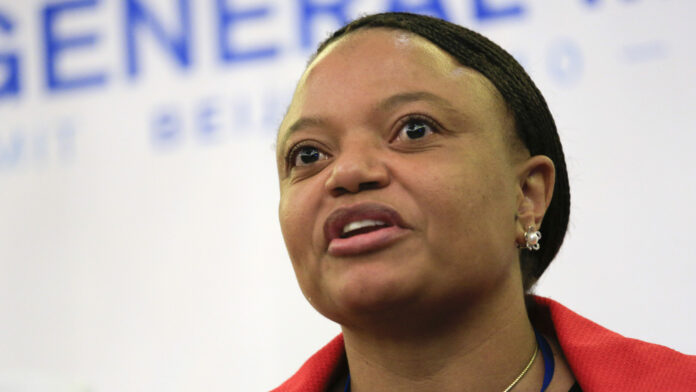
A DEFIANT Sizakele Mzimela, CEO of Transnet Freight Rail (TFR), faced the Joburg Indaba mining summit today just hours after announcing her resignation and blamed the lack of locomotives as the main reason for TFR’s poor performance in railing coal to Richards Bay.
Mzimela told conference host Bernard Swanepoel – who had previously indicated he was not sure she would pitch to deliver her presentation – that “you should know me better. I never shy away from a challenge”.
But she refused to comment on the reasons for her resignation which had been widely expected after the resignation last week of Transnet CEO, Portia Derby. “It would be inappropriate for me to respond to what are personal questions in a situation where I am supposed to be giving a presentation on what Transnet Freight Rail is going to do.”
But she then added: “It’s a personal choice at the end of the day. Things change and you decide whether you fit in or whether you are aligned.”
Later in the afternoon, Transnet confirmed Mzimela’s resignation, effective from the end of October. Russell Baatjies, the managing executive of TFR’s Cape Corridor, has been appointed acting CEO of TFR until a full time appointment is made, the rail and ports company added.
Mzimela’s resignation follows comments made by former Exxaro CEO and Minerals Council president Mxolisi Mgojo at the conference on Wednesday concerning the shake up at Transnet taking place as a result of the impact of the private sector initiative to improve performance at the troubled organisation.
Mgojo said the initiative had created greater accountability at Transnet and commented: “There’s no place to hide here. You will be caught out very, very quickly. I can tell you that right now. I will not say anymore but we have seen what has happened in the last week. It is very hot in that space.”
Mgojo’s reference – on which he declined to elaborate – clearly concerned the resignations of Derby and Transnet CFO Nonkululeko Dlamini, but he ducked a question on the future of Mzimela.
Mzimela told delegates that the lack of operational locomotives – because of a lack of spare parts – was responsible for more than 40% of the train cancellations that had taken place.
“Today we have 378 locomotives standing (defined as being out of operation for 50 days) of which just under 300 are the Chinese locos.”
She pointed out that these were “new” locomotives – between five and seven years old – and, because of their unavailability, TFR had been forced to fall back on its older “legacy fleet” locos. The shortage of spares resulted from “Chinese retaliation” following the cancellation by the South African Government of a key locomotive procurement contract.
Copper cable theft
Mzimela also highlighted the jump in security issues involving cable theft as another key issue. She said theft of copper cable had soared from 120 kilometres worth of cable in 2017/2018 to 1,560km in 2021/22.
She rejected the allegation that Transnet had lost too many skilled operators and staff through the voluntary separation programme that had been implemented.
That was highlighted as an issue recently by Vuslat Bayoğlu, CEO of coal exporter Menar, who told Miningmx in June that he supported Derby as Transnet CEO, but criticised her for the loss of senior staff through offering severance packages to make the Transnet management structure leaner.
“They lost critical skills by doing that. Now they do not have enough skilled executives to run these lines properly,” Bayoğlu said.
According to Mzimela “most of the people who left were train drivers over the age of 60. Transnet has fantastic young engineers.”
Waterberg expansion
Turning to projects Mzimela said plans were to have the second and third phases of the Waterberg line expansion completed by December 2025 which would add 11.2 million tons (Mt/y) of annual coal railage capacity to the line.
Following this plans were to complete the Botswana link, from Mmamabula in Botswana to Lephalale in South Africa, which would allow exports of coal mined in Botswana through South Africa, by December 2028 with a capacity of 6Mt/y.
Mzimela said the South African and Botswana rail operators were looking for a “turnkey” contract to build the Botswana link.










